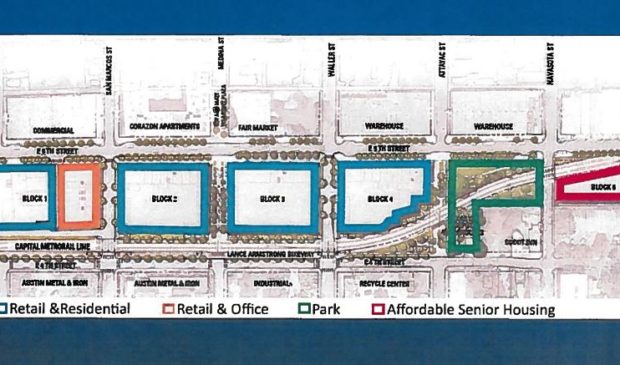Plaza Saltillo survives near derailment
Friday, March 3, 2017 by
Caleb Pritchard The Capital Metropolitan Transportation Authority’s Plaza Saltillo development survived a harrowing journey at City Council on Thursday night, but just barely.
Council eventually voted early Friday morning to approve the zoning request sought by the developer, Endeavor Real Estate Group, after a protracted discussion that featured two impassioned and opposing monologues from Council members Ora Houston and Pio Renteria and Renteria’s threat to scuttle the entire deal.
Previously, Council had supported the project moving forward, but only if Endeavor reduced from 125 feet to 70 feet the height of a proposed office building on the western edge of the 11-acre tract.
Residents, including the East Cesar Chavez Neighborhood Contact Team, accused Endeavor of misleading them about the proposed height as well as the number of affordable housing units. Endeavor countered that Capital Metro had requested that the firm’s proposal increase the office building’s height in order to provide more daytime activity for the mixed-use development that straddles the MetroRail Red Line just before it crosses under I-35 into downtown.
The firm also contended that its promises to provide 25 percent affordable housing had always included the understanding that it would pay for 15 percent while the city would cover the remaining 10 percent, as provided for in the Plaza Saltillo Transit-Oriented Development Regulating Plan.
On Thursday night, Renteria began the discussion by offering a motion to allow Endeavor to build the office building up to 125 feet if the resulting property tax value from that increase goes into the Housing Trust Fund to be used in the TOD area.
After Renteria made his motion, seconded by Council Member Delia Garza, a number of residents reiterated their complaints during public testimony that lasted just over an hour. Mayor Steve Adler then explained that his support for the project was based on its focus on addressing both affordability and mobility in one package.
After members struggled to understand the implications of the changes that would occur under Renteria’s motion, Garza forebodingly declared, “Nobody is excited about parts of this plan right now.”
Least of all was Houston, who, in a fiery speech, reminded her colleagues that the site was a freedmens’ colony named Masontown during the late 19th century. She aired her frustration at the lack of a clear plan to commemorate that history.
“How soon we forget the people who helped build this community, for money,” she said.
Renteria rejoindered by pointing out that he himself had grown up nearby Plaza Saltillo, and that as a young boy he used the empty land as a playground. He noted that many Mexican-American residents he grew up with had been displaced by rising housing costs, and said Endeavor’s proposal, with 141 rental units at 60 percent of the median family income, could reverse that.
“My passion is to bring people back who grew up in that neighborhood, not displace anyone,” he exclaimed.
Council approved an amendment offered by Mayor Pro Tem Kathie Tovo that would have required half of the 41 so-called floating affordable units – those that aren’t assigned to fixed locations in the development – to have at least two-bedrooms. However, when Michele Haussmann of Land Use Solutions, a consulting firm representing Endeavor, explained that the project could not be built with that requirement, Council began another round of wrangling that led to Renteria suggesting they scuttle the project and let Capital Metro go through another years-long process to find a new development partner.
Ultimately, Council pulled back from the brink and approved another amendment to require only 25 percent of the floating units be two-bedrooms or larger.
In the end, the item passed on third reading with an 7-4 vote. Adler, Renteria, Garza, and Council members Ann Kitchen, Greg Casar, Ellen Troxclair and Jimmy Flannigan supported it. Tovo, Houston, and Council members Leslie Pool and Alison Alter opposed it.
Afterwards, Jose Valera of the contact team told the Austin Monitor, “I’m disappointed in the overall outcome, though I am glad that throughout the entire process we did manage to get a couple more million dollars for affordable housing.”
Haussman said her team was grateful for Council’s permission to move forward. She added, “We also appreciate and respect the passion and input brought forth by the neighbors and various constituents. Plaza Saltillo development brings to fruition almost two decades of community input by multiple stakeholders, and we believe we have reached a solution that will significantly benefit the community.”
The Austin Monitor’s work is made possible by donations from the community. Though our reporting covers donors from time to time, we are careful to keep business and editorial efforts separate while maintaining transparency. A complete list of donors is available here, and our code of ethics is explained here.
You're a community leader
And we’re honored you look to us for serious, in-depth news. You know a strong community needs local and dedicated watchdog reporting. We’re here for you and that won’t change. Now will you take the powerful next step and support our nonprofit news organization?






